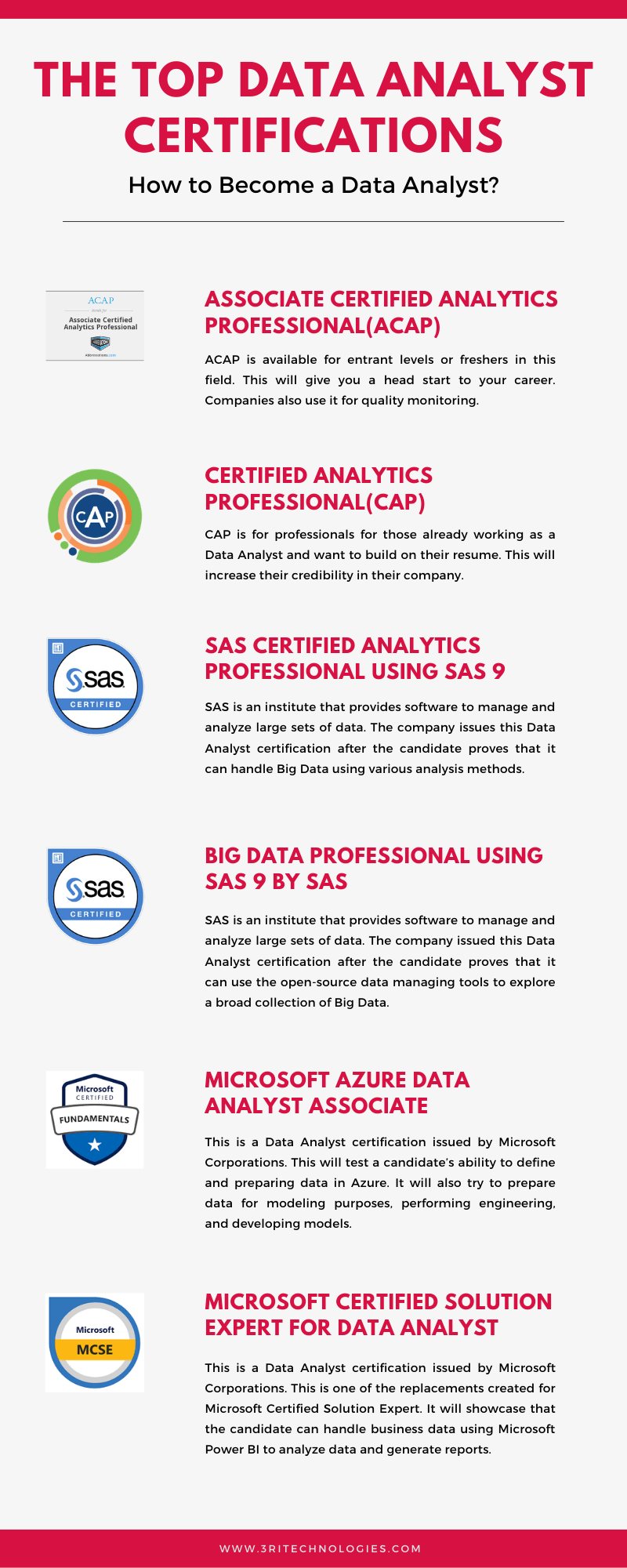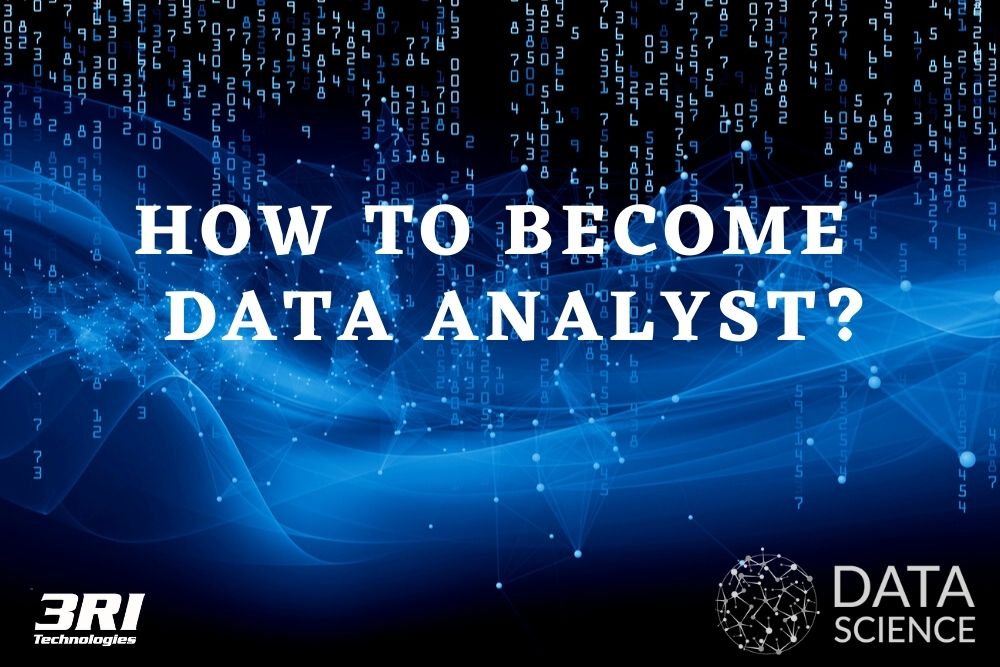In the digital era of data-driven environments, the significance of a data analyst’s role has grown substantially across diverse industries. The insights they extract from data empower businesses to make informed decisions, enabling growth and innovation. If you are intrigued by the prospect of becoming a data analyst, this comprehensive guide will illuminate the path ahead. From distinguishing data analysts from other analysts to charting out the journey to becoming one, including alternatives for those without degrees or experience, we will cover it all.
Many aspiring professionals today are asking, “who can become a data analyst?” The answer is broader than you might think. While a background in tech or stats is helpful, the core data analyst requirements are curiosity, an analytical mindset, and a passion for telling stories with data. To start on this path, it’s important to understand the typical data analyst course eligibility and find a program that fits your goals. So, what is a data analyst course? It’s a structured learning program designed to equip you with the essential skills in SQL, Excel, Python, and data visualization tools. For those ready to take the next step, our industry-aligned Data Analyst Courses In Pune provide the perfect launchpad for a successful career.
Understanding the Core Requirements and Path to Success
Everywhere on social media platforms like Facebook, Google people are found searching or visiting a web-page. I always hear this data is useful for several companies. But used to wonder what they can do this with random data.
And then came the answer. This data is used by them to understand human nature, the biggest mystery of nature. This data is used to design innovations, decide a strategy for marketing, and increase sales.
Exceptional professionals called Data analysts are hired by these companies to make sense of data.
So let us now understand What is Data analysis?
What is Data Analysis?
Data analysis is an exhaustive study of all data gathered from different platforms like Facebook, Twitter, Amazon, etc. This Tera Bytes of data is then converted to relevant information that companies can use to increase their profits.
Enroll in our Data Analytics Course in Pune today
Who is a Data analyst?
Data analysts are professionally hired to convert these bytes of 0’s and 1’s to natural language, which can be easily understood by non-technical entrepreneurs.
They work like police officials. They question the data and fetch the desired answer with specific techniques. This information can be used to make decisions whether there is a need to increase production or not, what people are exactly looking for, help in deciding product or service pricing, and so on.
When I randomly looked for job opportunities for a Data Analyst jobs on popular job portals like Naukri.com, I came across around 3884 vacancies in Pune itself.
The companies hiring were Cognizant, Wipro, Infosys, and so on. The demand for Data Analyst is increasing day by day as companies have several ways to generate extensive data needed for analysis. This data analysis industry will grow from $3 billion to $6 billion by 2025 as per current market trends.
On average, any Data Analyst can earn Rupees 6 lakhs per annum in India. Globally you may earn $60k as an annual average wage.
Certified professional courses also boost the salary package for the right employee.
A Data Analyst’s salary can then quickly get a hike to Rupees 10 lakhs per annum or more in India. Also, globally you can earn $100K or more.
Also, the salary of a Data Analyst depends on years of experience and the company’s location.


Data Analytics is a lifeline for almost all the business, whether it is Grocery shops, Motor sales, and so on. The initial plan of starting any business starts with analyzing the market trends and then taking steps accordingly. It increases the success rate for the company.
People are frequently on the search for the right candidate with the best skills.
Earlier, these tasks would have been a tedious process, but with the help of Data analyst, work has become easier for these companies. The role of a data analyst is creative and satisfactory in monetary terms. So let us now understand their roles or responsibility.
Roles of a Data Analyst:
- They help in setting goals for the company.
- They are also responsible for removing unwanted data. They also divide or prune the data into a different subdivision for better analysis.
- They carry out Data mining, a process to understand the patterns in this large set of data.
- They carry out analysis and translation of this data.
- Based on this process, they generate visual reports for the business to make necessary decisions.
- They are responsible for designing and maintaining database systems.
- They need to work with the management to understand the requirement and accordingly generate results for them near.
How to Become a Data Analyst?
- Get a Foundational Education
A solid educational foundation is crucial for a career in data analysis. Many data analysts hold degrees in fields like Statistics, Mathematics, Economics, Computer Science, or a related discipline. Usually, you start with a Bachelor’s degree. But getting a Master’s degree can help you really get into the details of how to analyze data and use different technologies and tools.
While formal education holds value, it’s not the sole pathway to becoming a data analyst. There are alternative routes for individuals passionate about data analysis without a traditional degree.
2. Build Your Technical Skills
Get really good at programming languages. Learning languages like Python or R is super important for data analysts. Besides, having a good grasp of programming languages like Python or R is crucial for data analysts. These languages are used to play with data, do statistical analysis, and create data visualizations. Familiarize yourself with tools like SQL for database management and data querying. Learning to work with data visualization libraries like Matplotlib or Tableau is also advantageous.
In addition to technical skills, develop a strong foundation in statistical concepts. When evaluating data and producing meaningful findings, understanding concepts such as probability, regression analysis and hypothesis testing will be important.
3. Work on Projects with Real Data
Hands-on experience is invaluable in data analysis. Engage in personal or collaborative projects using real-world data sets. This hands-on experience will help you improve your skills and demonstrate your ability to potential companies.
Choose projects that reflect your interests and allow you to demonstrate your competence. For example, you could analyze consumer behavior data for an e-Commerce website, examine healthcare trends, or evaluate financial market data. Document your process, challenges faced, and insights gained from each project.
4. Develop a Portfolio of Your Work
Add different kinds of projects to your list. Show off skills like cleaning data, exploring it, making models, and visualization. A well-organized portfolio is a tangible way to exhibit your capabilities to prospective employers.
In your portfolio, provide context for each project, detailing the problem you aimed to solve, the data used, the techniques applied, and the outcomes achieved. Visualizations, code snippets, and explanations of your analysis methods will provide a comprehensive view of your skills.
5. Practice Presenting Your Findings
Data analysts need to practice effectively communicating their findings to people who might not be tech-savvy. Practice turning complex analyses into easily digestible insights and present your findings clearly through reports, dashboards, or presentations.
Strong communication skills are required to bridge the gap between technical analysis and practical conclusions. Create mock presentations for your portfolio projects, focusing on conveying the significance of your findings and recommendations.
6. Get an Entry-Level Data Analyst Job
Start your journey as an entry-level data analyst. Gain experience by working with mentors and senior analysts. This role provides a platform to apply your skills, learn from others, and gain exposure to real-world data challenges.
As an entry-level data analyst, your responsibilities may include data cleaning, data transformation, basic analysis, and supporting more senior team members. This experience will help you build confidence in your skills and provide insights into the day-to-day tasks of a data analyst.
7. Gain Certifications
Certifications can enhance your credibility as a data analyst. Consider pursuing certifications such as:
Google Data Analytics Professional Certificate: Offers hands-on experience with data analysis tools.
IBM Data Analyst Professional Certificate: Covers data analysis techniques using tools like Excel and Python.
Microsoft Certified: Data Analyst Associate: Validate skills in using Power BI for tasks like data modeling, data visualization, and analysis.
Certifications offer defined learning paths as well as exams that certify your abilities. They can also be advantageous when transitioning into the field or seeking new opportunities
8. Good grounding of Statistic topics like Numerical Analysis, Graph Analysis, Linear Algebra with Regression, Real Analysis. It will help you decide the logic that can be used for formulating the algorithm according to client requirements.
9. Also, they need to be well versed with different analytical tools like Python, R, SAS, etc. Certification in these tools will help in standing out in a crowd of Data Analyst.
10. Also, high proficiency is needed in SQL, My SQL, Hive, and so on. Data analysts need to fetch data from different sources, transform their desired format, and loads them in a data warehouse. Also, query knowledge is a must to understand the trends of the market. Even you must know how to maintain Datawarehouse, which stores these large sets of critical data.
11. Proficiency in Advanced features like Pivots, Macros, V-lookups of Microsoft Excel is required. It will help in handling a smaller set of data for quick analysis.
12. Knowledge in Data Cleaning tools is necessary to remove unwanted data, which will reduce translation and computation time. Data Visualization tools like Tableau knowledge would add feathers to your hat.
13. To top the list, expertise in Big Data Hadoop is essential as it will help to help to explore, filter, sample, and summarization of super large set of data. Among the employers, this is a popular skill they look for when searching for competent Data Analyst.
14. A Data Analyst must also have skills to investigate and verify data which can be used to analyze the given data set and provide results to the business.
1. Effective communication is equally important. As a result, a Data Analyst’s findings need to be conveyed to a non-technical team of Sales and Marketing.
2. They need to be creative and thinkers. They need to ask questions to the concerned team to understand the needs that will help them decide their algorithm design for data analysis.
3. Industry knowledge is an added advantage. This will give you business insights and help you in making correct decisions for the business.
To begin your journey, you can enroll yourself in the best offered Data Analytic course at 3RI Technologies in the classroom or online. With ten years of IT training experience, they offer the best hands-on training.
They have a team of expert professionals, having 8-10 years of industry experience. This team designs the course considering all the latest releases in any IT technology and industry requirements.
Also, we provide you with flexible batch timings, making it easier for working professionals. Again, if you miss a class, we make sure you attend any course as per your convenient time. This has been one of the USP of our training center.
They follow a holistic approach for training i.e.; They include theoretical as well as practical knowledge. Their classrooms have the best labs in the town with upgraded software to train you practically. They also assist in installing the necessary software if enrolling for an online course.
The LIVE projects or assignments that we need to work on as a part of the training help us understand the work culture and real applications developed in industries.
Our team will award a certificate of completion on the successful completion of the course.
They provide placement assistance. Their team helps us to write our resumes. Also, they help us with probable interview questions preparing us for the interviews.
Certification makes it easier for us to begin our career with Data Analytics. Even this guarantees the employer that a certified professional will know their skills as a Data Analyst. This makes them comfortably accepted in this competitive world. Check out Data Science Course in Pune Enroll now!
So now let’s discuss the different certifications available for Data Analyst
The top Data Analyst Certifications are:
- Associate Certified Analytics Professional(ACAP)
- Certified Analytics Professional(CAP)
- SAS Certified Analytics Professional Using SAS 9
- SAS Certified Big Data Professional Using SAS 9
- Microsoft Azure Data Analyst Associate
- Microsoft Certified Solution Expert for Data Analyst
Associate certified Analytics Professional(ACAP)
INFORMS provides this Data Analyst certification.
ACAP is available for entrant levels or freshers in this field. This will give you a head start to your career. Companies also use it for quality monitoring. It can also get you a promotion which you might be waiting for a long time.
This Data Analyst certification exam will test you in your analytical skills like framing a business problem, analyzing the situation, selecting an appropriate solution method, building a model, deploying, and managing the life cycle.
Certified Analytics Professional(CAP)
INFORMS provides this Data Analyst certification.
CAP is for professionals for those already working as a Data Analyst and want to build on their resume. This will increase their credibility in their company.
This is the next step that one can take to show your learning skills to your employers. This Data Analyst certification will help you to develop your business analytical skill. It will also teach you different statistical methods that can be used.
The certifications have four parts, namely Algorithm creation, Probability & Statistics, Exploring Data analysis methods to visualize them, Machine Learning.
SAS Certified Analytics Professional Using SAS 9
SAS is an institute that provides software to manage and analyze large sets of data. The company issues this Data Analyst certification after the candidate proves that it can handle Big Data using various analysis methods. The candidate must already be working with some machine learning language. They must also have experience of detecting a pattern, doing experiments in business, predicting techniques.
There are three exams taken as a part of this certification to test your below
There are three exams taken as a part of this certification to test your below skills
- Predicting techniques using SAS
- Advanced Predicting techniques using SAS
- Analyzing a text, experimenting, and optimizing for better results
Big Data Professional Using SAS 9 by SAS
SAS is an institute that provides software to manage and analyze large sets of data. The company issued this Data Analyst certification after the candidate proves that it can use the open-source data managing tools to explore a broad collection of Big Data.
There are two exams taken as a part of this certification to test your below skills
- Preparing Big Data for statistical and visual analysis
- Loading and Programming Big Data
Microsoft Azure Data Analyst Associate
This is a Data Analyst certification issued by Microsoft Corporations. This will test a candidate’s ability to define and preparing data in Azure. It will also try to prepare data for modeling purposes, performing engineering, and developing models.
The candidate will have to use NLP(Natural Language Processing), computer vision, speech, and prediction methods for analysis.
Microsoft Certified Solution Expert for Data Analyst
This is a Data Analyst certification issued by Microsoft Corporations. This is one of the replacements created for Microsoft Certified Solution Expert. It will showcase that the candidate can handle business data using Microsoft Power BI to analyze data and generate reports. These candidates on passing prove that they can design and build data models, cleaning and transforming data. They can also use advanced methods for analysis.
All these Data Analyst certifications need preparation. This can be done by enrolling at 3RI Technologies Data Science And Machine Learning Course, the pioneers in the IT training industry.
So, don’t wait and enroll yourself Data Science Online Training at 3RI Technologies to accelerate your career. Check Data Science Training in Noida.

Data Analysts vs. Other Types of Analysts
Data analysts are often confused with other types of analysts, such as business analysts or financial analysts. While their roles may intersect at times, they differ because they pay attention to different things and are skilled in different ways.
Business Analysts: Business analysts primarily concentrate on understanding business processes, identifying inefficiencies, and recommending solutions to enhance operations. hey collaborate with individuals or organizations to gather necessary specifications and facilitate the alignment between business objectives and technological solutions.
Financial Analysts: Financial analysts focus on assessing financial data to provide insights related to investment decisions, budgeting, and risk assessment. They examine market movements, financial information, and economic metrics in order to guide financial decisions.
On the other hand, data analysts are skilled in comprehending data sets to extract significant insights. They manipulate and clean data, use statistical techniques for analysis, and visualize findings to aid decision-making across a wide range of domains.
How to Become a Data Analyst Without a Degree
A degree is beneficial but not always a strict requirement for becoming a data analyst. To forge this path:
Skill Mastery: Dedicate time to mastering the technical skills required for data analysis. Online resources, tutorials, and courses can serve as effective learning tools.
Online Courses: Enroll in online courses or certifications from platforms like Coursera, Udemy, or edX to learn data analysis skills. These courses often provide comprehensive content and practical exercises.
Projects and Portfolios: Work on data analysis projects and construct a robust portfolio to highlights your skills and competencies. Highlight your technical skills, project outcomes, and insights gained.
Networking: Connect with professionals and learn from their experiences by attending industry events, meetups, and online forums. Networking can assist you in discovering fresh opportunities and staying updated on the latest advancements within the industry.
Internships or Entry-Level Roles: Start with internships or entry-level positions to gain practical experience and build a track record. While these roles may require less experience, they offer valuable insights into industry practices and expectations.
How to Become a Data Analyst Without Experience
Landing a data analyst role without experience is possible through strategic steps:
Education and Skills: Focus on building a strong skill set through educational courses and self-study. Master the essential tools, programming languages, and analytical techniques.
Internships or Volunteer Work: Gain experience by working on freelancing projects, internships, or as a volunteer. These opportunities can help you apply your skills and gain practical insights.
Freelancing or Contract Work: Begin with freelancing or contract positions to accumulate experience and expand your network. Freelance projects allow you to work on diverse projects and develop a portfolio.
Networking: Leverage professional networks, attend meetups, and engage with online communities to discover opportunities. Networking can lead to connections that provide insights into job openings.
Showcase Your Skills: Develop a portfolio that highlights your capabilities and achievements, even if they are from personal projects. your proficiency and the potential value you can bring.
Final Thoughts
Becoming a data analyst is achievable through dedication, ongoing learning, and practical experience. Regardless of your educational history or prior experience, the need for capable data analysts presents numerous chances to start an exciting career in this IT industry.
From foundational education and technical skills to practical experience and networking, the path to becoming a data analyst involves a blend of structured learning and real-world application. Whether you have a degree or not, your passion for data analysis and dedication to improving your skills will set you on a path toward success in this dynamic and impactful field







